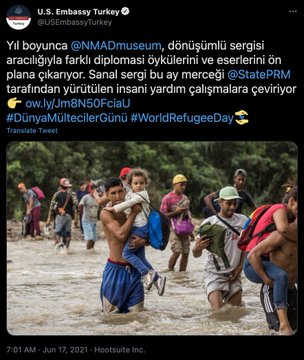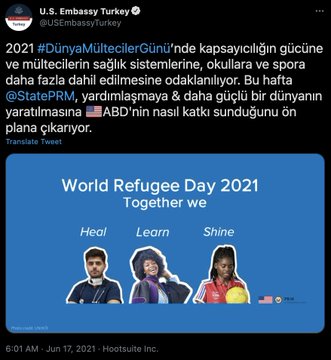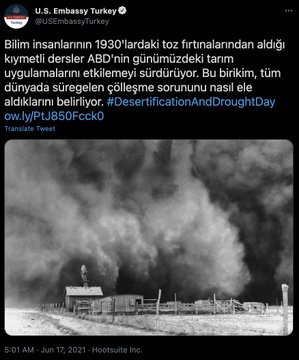In the absence of a cure for Alzheimer's and other forms of dementia, the most important interventions for upholding brain function are preventive — those that help maintain our most marvelous, mysterious organ.
Based on the science, I take fish oil and broil salmon. I exercise. I try to challenge my cortex to the unfamiliar.
As I wrote my recent book, A History of the Human Brain, which recounts the evolutionary tale of how our brain got here, I began to realize that so many of the same influences that shaped our brain evolution in the first place reflect the very measures we use to preserve our cognitive function today.
Being social, and highly communicative. Exploring creative pursuits. Eating a varied, omnivorous diet low in processed foods. Being physically active.
[. . .]
Being active improves performance on mental tasks, and may help us better form memories. Long before the Peletons sold out, our brains relied on both mental and physical activity.
But overwhelmingly the evidence points to embracing a collection of lifestyle factors to keep our brain healthy, none of which existed in a Darwinian vacuum.
Finding food was as social an endeavor as it was mental and physical. Our creative brains harnessed information; gossiping, innovating, and cooking our spoils around the campfire. Researchers are beginning to piece together the complex pathology behind the inevitable decline of the human brain, and despite a parade of failed clinical trials in dementia, there should be promising treatments ahead. Until then, in thinking about preserving the conscious experience of our world and relationships — and living our longest, happiest lives — look to our past.
So that's some science. Here's some more from Rachel Ramriez (CNN) only it's depressing:
The planet is trapping roughly double the amount of heat in the atmosphere than it did nearly 15 years ago, according to an alarming new analysis from NASA and the National Oceanic and Atmospheric Administration.
Researchers say it's a "remarkable" amount of energy that is already having far-reaching consequences.
"It's excess energy that's being taken up by the planet," said Norman Loeb, a NASA scientist and lead author of the study, "so it's going to mean further increases in temperatures and more melting of snow and sea ice, which will cause sea level rise — all things that society really cares about."
The study, published this week in the journal Geophysical Research Letters, found that what's known as the Earth's energy imbalance — the difference between how much of the sun's energy the planet absorbs and how much energy is radiated back into space — approximately doubled from 2005 to 2019. The result was "striking," the research team wrote.
Victoria Bekiempis (GUARDIAN) adds:
Scientists from Nasa, the US space agency, and the National Oceanic and Atmospheric Administration (Noaa), reported in a new study that Earth’s “energy imbalance approximately doubled” from 2005 to 2019. The increase was described as “alarming”.
“Energy imbalance” refers to the difference between how much of the Sun’s “radiative energy” is absorbed by Earth’s atmosphere and surface, compared to how much “thermal infrared radiation” bounces back into space.
“A positive energy imbalance means the Earth system is gaining energy, causing the planet to heat up,” Nasa said in a statement about this study.
Scientists determined there was an energy imbalance by comparing data from satellite sensors – which track how much energy enters and exits Earth’s system – and data from ocean floats.
This system of data-gathering floats, which stretches across the globe, allows for “an accurate estimate of the rate at which the world’s oceans are heating up”.
We have a climate crisis and denying that is not helping anymore. We need to get honest and we need to get serious about addressing the crisis.
"Iraq snapshot" (THE COMMON ILLS):
Friday, June 28, 2021. We look at refugees for today's snapshot because . . .
Sunday is World Refugee Day. UNHCR explains:
What is World Refugee Day?
World Refugee Day is an international day designated by the United Nations to honour refugees around the globe. It falls each year on June 20 and celebrates the strength and courage of people who have been forced to flee their home country to escape conflict or persecution. World Refugee Day is an occasion to build empathy and understanding for their plight and to recognize their resilience in rebuilding their lives.
Why is World Refugee Day important?
World Refugee Day shines a light on the rights, needs and dreams of refugees, helping to mobilize political will and resources so refugees can not only survive but also thrive. While it is important to protect and improve the lives of refugees every single day, international days like World Refugee Day help to focus global attention on the plight of those fleeing conflict or persecution. Many activities held on World Refugee Day create opportunities to support refugees.
When is World Refugee Day? When did World Refugee Day start?
World Refugee Day falls each year on June 20 and is dedicated to refugees around the globe. World Refugee Day was held globally for the first time on June 20, 2001, commemorating the 50th anniversary of the 1951 Convention relating to the Status of Refugees. It was originally known as Africa Refugee Day, before the United Nations General Assembly officially designated it as an international day in December 2000.
What happens on World Refugee Day?
Each year, World Refugee Day is marked by a variety of events in many countries around the globe in support of refugees. These activities are led by or involve refugees themselves, government officials, host communities, companies, celebrities, school children and the general public, among others.
UNHCR notes that Germany is the country that hosts the most refugees (1.2 million -- with over two-thirds being from Iraq, Afghanistan and Syria). And the agency Tweets:
The pandemic continues but, note, the lockdown did not result in a decrease in the number of refugees for 2020. In fact, the numbers increased with an estimated 82/4 million worldwide being refugees. The Kurdistan Region of Iraq hosts a large number of refugees. NRT Tweets:
UNHCR issued the following:
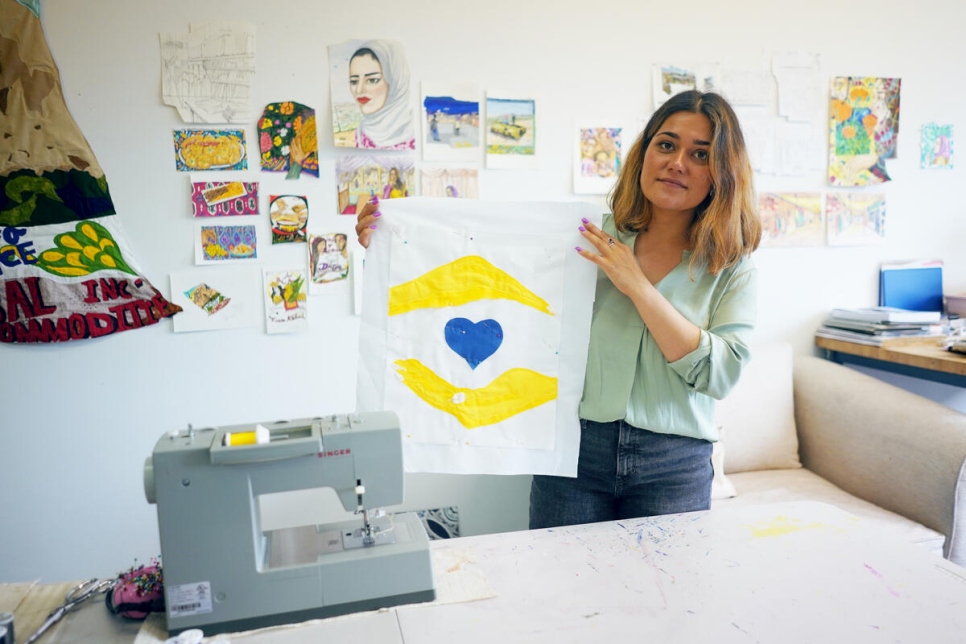
Hangama Amiri, an Afghan-Canadian artist and former refugee is the designer of the 2021 World Refugee Day Twitter emoji. © UNHCR/Ashley Le
NEW YORK – UNHCR, the UN Refugee Agency, and Twitter have teamed up with a refugee to design an emoji honouring the millions of people forced to flee war and persecution.
UNHCR and Twitter commissioned Afghan-Canadian artist Hangama Amiri to create the emoji for World Refugee Day, celebrated each year on 20 June. It is the first time the emoji has been designed by a refugee. The design features a blue heart cupped between two hands to symbolize protection and solidarity. It goes live today and will be activated on any tweet that uses the hashtags #WorldRefugeeDay, #WithRefugees and #RefugeeDay, in any of 12 languages, through 23 June.
“Twitter is pleased to continue our partnership with UNHCR with the creation of this emoji honouring those who are forced to flee war and persecution,” said Twitter’s Director of Public Policy, Government and Philanthropy for Middle East and North Africa, George Salama. “We are especially proud that this year for the first time, the emoji has been designed by a refugee, Afghan-Canadian artist Hangama Amiri. We hope that Hangama’s story will inspire others and the emoji will help to raise awareness and demonstrate solidarity with the refugee community worldwide.”
Hangama Amiri was born in a refugee camp in Pakistan and displaced multiple times as a child due to the conflict raging in her native Afghanistan. As a young refugee, Amiri said drawing helped her feel safe and make sense of things around her.
While living in Tajikistan, she received a scholarship after winning an art competition held by UNHCR. In 2005, she and her family were resettled in Nova Scotia, Canada. She recently completed a graduate degree at the Yale School of Art in the United States. Her colourful textile work explores issues related to feminism, geopolitics and memory and has been exhibited across Europe, Canada and the United States.
“I decided to come up with an idea around hope, togetherness and love,” Amiri said. “As a refugee, the love around me was the only thing I held on to.” She created a tangible version of the digital emoji by sewing together scraps of colourful fabric, a technique she uses frequently in her artwork.
More than 80 million people around the world have been forced to flee their homes, seeking refuge within their own country or across borders.
The United Nations designated 20 June as World Refugee Day 20 years ago to mark the 50th anniversary of the 1951 Convention on the Status of Refugees. Twitter has worked with UNHCR for several years to raise awareness of the rights, needs and hopes of forcibly displaced people.
This World Refugee Day, UNHCR calls for the greater inclusion of refugees in our communities, and especially access to health care, education and sport.
“The shared experience of COVID-19 has taught us that we are stronger when we work together,” said Gisella Lomax, Head of Social Media at UNHCR. “This year’s World Refugee Day emoji is about togetherness and love, and we encourage Twitter users to share it as a sign of solidarity for all people forced from home.”
Throughout the pandemic, social media has been a lifeline to many for vital health information, for news, for interactions with friends and family and more. It has also been important to organisations like UNHCR, where social media - and especially Twitter - is a central part of our communications and external outreach, enabling us to inform, inspire and mobilise action. UNHCR is grateful to Twitter for their long-standing partnership and support for our work and the refugee cause.
Abdallah al-Obaid shares his story at UNHCR:
Stay away from the windows!” my first grade teacher shouted as the school shook from an explosion. The windows shattered into a million crystal shards. I was the target.
Through the suffocating smoke, I crawled outside the burning classroom lightheaded. I held onto my teacher, afraid of being left behind, afraid of inhaling the smoke or the smoke inhaling me. I saw flames outside the window and shards of glass over my friends’ bodies. I never saw them again.
A few weeks before the bomb, my father received a death threat for notifying American forces about a government torture facility. His patriotism put our family in mortal danger. It cost him, and our family’s future in Iraq -- and very nearly our lives.
I hid in an empty fridge under the stairs during air raid sirens. I overheard my parents talking in the living room. My mom said, "We have to leave. Iraq is not safe anymore.” When I heard that discussion, I was a child -- the next day I became a refugee.
We fled to Jordan and for eight years lived with no citizenship, no health insurance and very limited opportunities. While a refugee, I learned to play the guitar. I was finding my voice through music. As I healed, I was becoming more aware of those around me, and I grew a desire to help ease their physical and emotional suffering. It was in Jordan that my dreams of one day becoming a doctor began to take shape.
In 2013, after eight years of living as refugees, my family was accepted to resettle in the United States. We landed at the JFK airport and after six hours of background checks, the immigration officer said, “Welcome to America.”
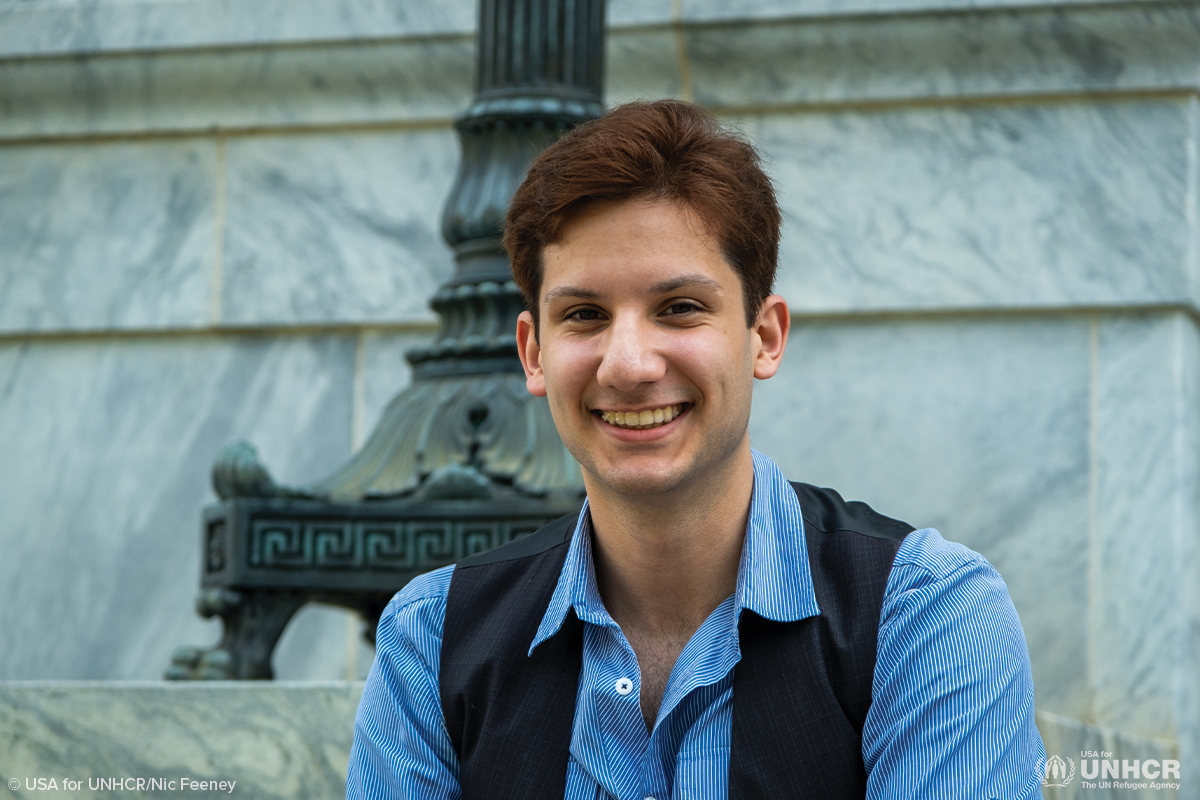
We moved to Winder, Georgia, and at first, I had the feeling that I was losing my voice again. Before I even started school, the board of education decided it was impossible for me to pass the state tests and suggested I repeat 9th grade. But I was hungry to move forward and I petitioned the school board to let me take the state exams. I taught myself English by reading the dictionary, and word by word, I learned English, and passed all the exams. I was finding my voice again, this time in another language. A few short years later, I graduated as the student body president and was accepted to Emory University.
At Emory, I began volunteering as a medical interpreter at a clinic in Clarkston, Georgia. One of my first experiences as an interpreter was with a refugee from Syria. He arrived at the clinic disoriented and spoke no English. At that moment, I was helping him find his voice.
“He’s on Lisinopril, Bisoprolol and Aspirin,” I told the doctor. I listed his medications and medical history. He said “shukran,” Arabic for thank you, to me. I said to him in Arabic, “I too once spoke no English. I am here for you.” Then we talked about his favorite foods and his family. It mattered to me to learn about him and to try and help him feel more comfortable in that moment.
Volunteering as an interpreter at the clinic only fueled my interest in pursuing a career in the medical field. Although still a college student, I wanted to do more. I became an EMT.
My first patient had a cardiac arrest. I got the call over the radio, “Med 67 you are dispatched to a house fire!” There was no house, only flames. This smell of smoke was familiar.
Flashbacks leaked into my mind as if I were standing in my classroom again. A woman lay on the grass. Motionless. I started CPR. With each compression, my hands would slide on her burned skin, “1, 2; 9; 29…” Sweat was dripping from inside my gloves as we got to the ER. I did everything I could, but I could not save her.
The realization of my own powerlessness was humbling. Sometimes, even doing everything right is not enough, and that is okay.
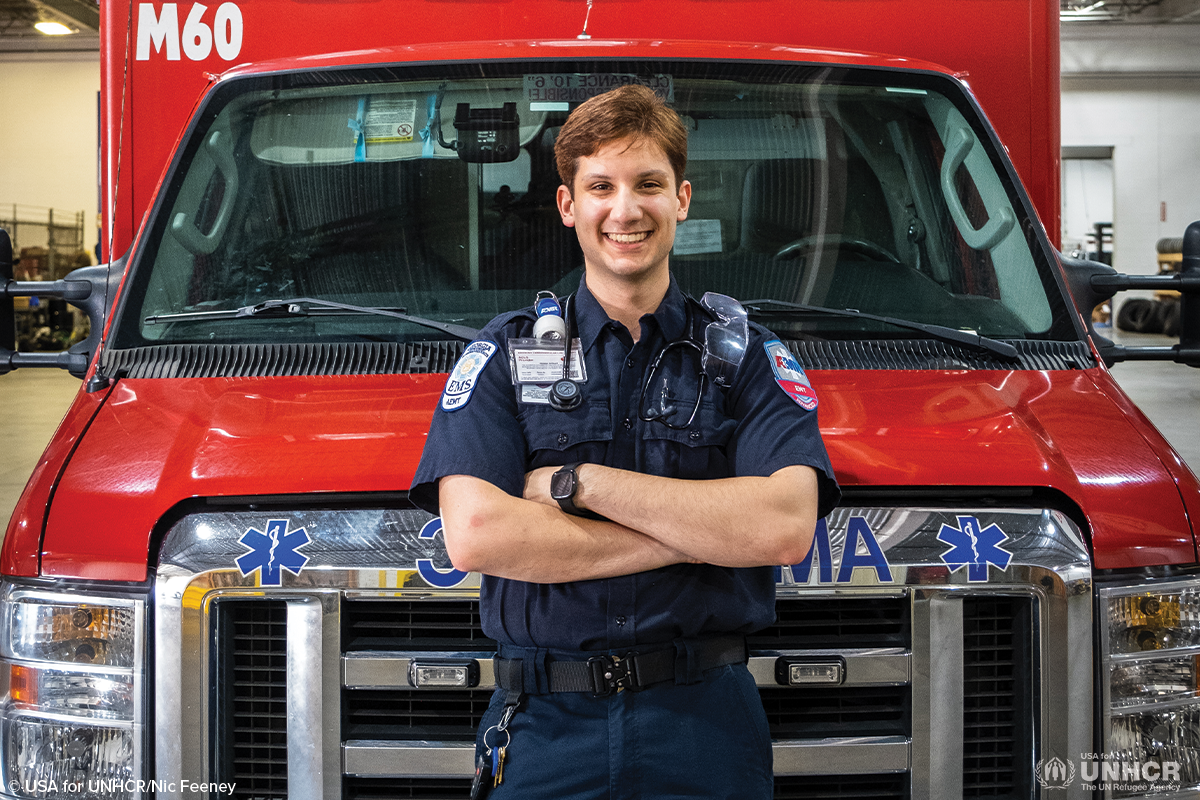
Soon after beginning my job as an EMT, the COVID-19 pandemic gripped the world. I was now a first responder working in the midst of a global pandemic. In the last year, I’ve not only witnessed the disparity of healthcare in different communities in Georgia but experienced how unprepared and under-equipped we were at times to safely do our jobs during a public health crisis as first responders. My hope for the future is to become a doctor and care for my patients, but I also want to be part of a movement that creates a system where no one feels left behind.
The culmination of everything I have experienced in life, medicine is my commitment to science and to people. Healing takes time: even with music, it took me years to overcome the stigma of being a refugee, and the trauma I faced as a child. At the heart of every patient interaction is my desire to listen, as a human, and help the other person find their own voice.
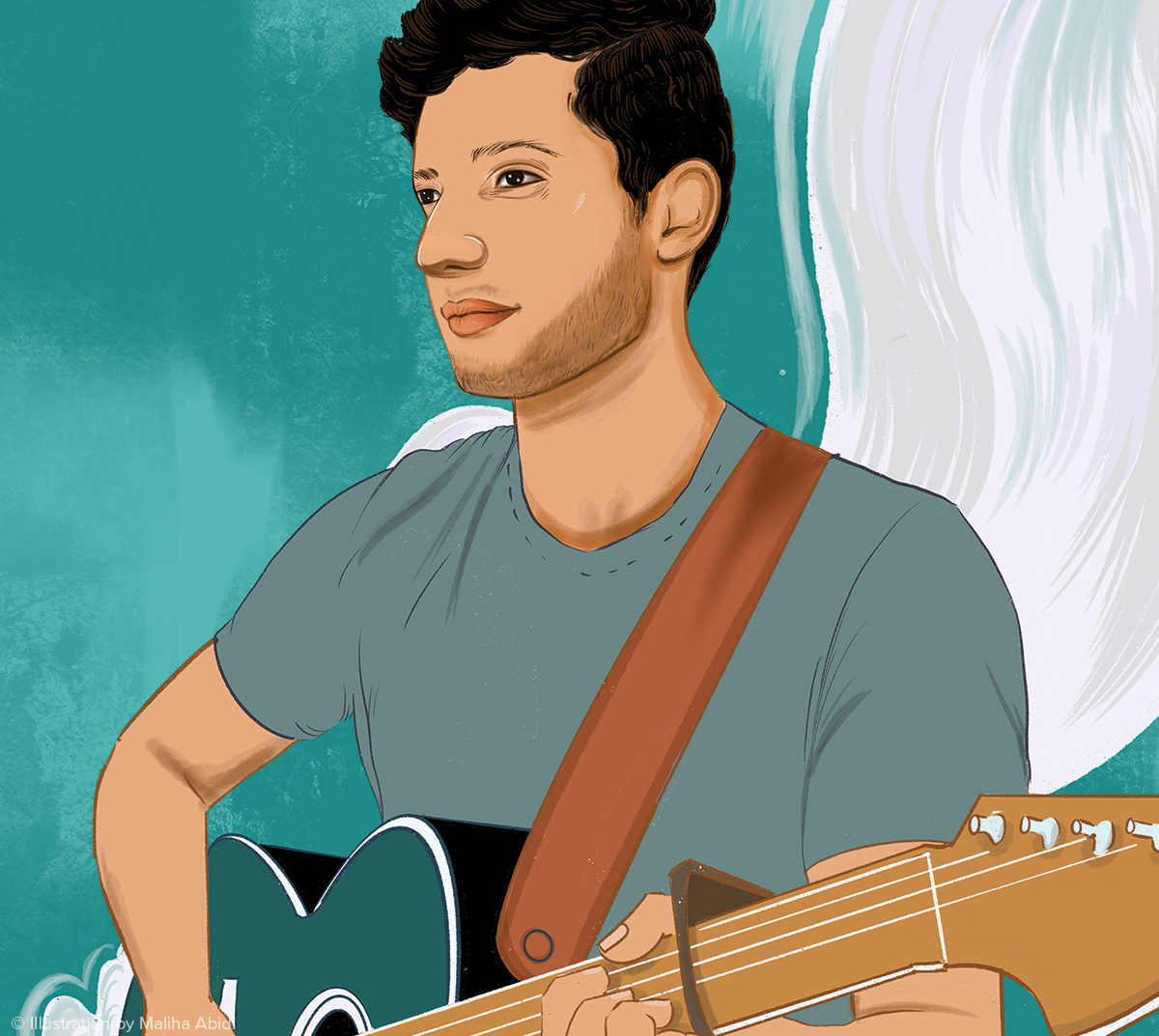
I traveled 7,000 miles for a chance for a new home, for a future. Not many refugees are as lucky as I am. I am one of the few refugees given another chance. In 2019 I became an American citizen, and I’m so happy about that, but I still think of everything I lost. Like my family home in Iraq. We had a garden filled with white gardenias that I used to play in as a kid. Still to this day, when I want to think about Iraq and my childhood, I light a gardenia-scented candle and for those moments I’m back in our courtyard.
Today, I am grateful for where I am. The dream of becoming a doctor that began to take shape as a child in Jordan is becoming a reality. I was recently admitted to the Tufts University School of Medicine. There is a lot more to do but I know with hard work, and support from family and friends, I will find my voice once again, this time, as a doctor.
Abdallah's story is just one voice from the Refugee Youth Storyteller’s Celebration we are sharing in recognition of World Refugee Day on June 20.
April Hunt writes about Abdallah for Emory University's website here.
In 2020, the government of Turkey celebrated World Refugee Day by bombing a refugee camp in Iraq -- but they did so in April so maybe that's why most of the world didn't note that government's 'humanitarian' contribution? This year, they did the bombing just a few weeks prior to World Refugee Day. Karwan Faidhi Dri (RUDAW) reported:
Three people were killed in a suspected Turkish airstrike near Makhmour camp in northern Iraq on Saturday afternoon.
“It was an airstrike and took place near Makhmour refugee camp.
According to confirmed information, three people have died,” Sirwan
Barzani, commander of Peshmerga forces on the Makhmour-Gwer front, told
Rudaw.
A resident of the camp, who asked to be identified only as Ahmed, had
earlier told Rudaw that Turkish air forces bombed the camp, killing at
least one person and injuring a second.
Rashad Galali, deputy head of the Patriotic Union of Kurdistan (PUK) office in Erbil, also told Rudaw that three people died.
Makhmour camp hosts more than 12,000 Kurdish refugees who fled
persecution by the Turkish state, mainly in the 1990s. It is located in
areas disputed between Erbil and Baghdad.
A REUTERS report on the bombing included this:
U.S. ambassador to the United Nations Linda Thomas-Greenfield visited Ankara last week and said she told officials that "any attack targeting civilians at Makhmour refugee camp would be a violation of international and humanitarian law".
After the bombing, Turkey refused to acknowledge the deaths of civilians -- a pattern -- but instead quickly claimed to have killed 'terrorists' -- again, a pattern.
Khazan Jangiz (RUDAW) reported Wednesday:
An Iraqi security and ministerial delegation visited the Makhmour
refugee camp on Monday to investigate recent Turkish attacks on the camp
that have killed four people.
"Baghdad's joint delegation searched the camp. We called for the
protection of civilians, and we said that the Kurdistan Region has not
allowed our people to enter Erbil and Duhok for two years," Haji Kachan,
co-chair of the Makhmour Camp Council, told Rudaw on Monday.
Makhmour camp hosts more than 12,000 Kurdish refugees who fled
persecution by the Turkish state, mainly in the 1990s. It is located in
areas disputed between Erbil and Baghdad. Ankara believes the camp has
ties with the Kurdistan Workers’ Party (PKK). On June 5, a Turkish
airstrike near the camp killed three people and on Friday, Turkey claimed it killed a senior PKK official near Makhmour.
The Iraqi government delegation that visited included representatives
from the interior and migration ministries, as well as security
officials. They asked to set up an Iraqi administration in the camp and
make some changes in order to increase protection for the residents,
according to Kachan.
The deputy commander of Iraqi Joint Operations on Monday said they need
to boost protection for the camp. “Security will be enhanced with the
presence of local police forces,” said Lieutenant-General Abdul Amir al-Shammari.
The world watches as most media outlets just present unverified claims made by the Turkish government as facts just as the world watches as the Turkish government takes no acc ountability for the destruction they caused and are causing.
Meghan Bodette Tweets:
Wrapping up quickly. What does a BAD FAITH interview have to do with an ECONOMIST article e-mails are demanding we note? That neither are going to be noted. Elections are supposed to take place in Iraq this October. And we're not going to part of the latest wave of Operation Happy Talk. They've scaled back, yes, but it's still propaganda. As for the interview on BAD FAITH?
Not interested.
A disgusting piece of trash is now a co-host of a YOUTUBE program. Since he became a host and since Krystal and Saagar left, the show has lost its audience. Look at Bri-Bri come along to offer him a rescue line. Oh, he admits, now, that FORCE THE VOTE was a good strategy? Now? After it no longer matters, after he's slandered and slimed so many people?
He doesn't mean it. He's just trying to save his job because the numbers on that program are awful. Meanwhile, Krystal and Saagar are doing just fine with a huge start to their new program. BREAKING POINTS. We're not here to save a piece of trash's job. Nor are we stupid. He needs people to talk about him -- which is why we're not mentioning his name -- and we're not going to help him out. I doubt this sincerity for good reason and I don't see that interview as worth promoting.
Speaking of, a number of you have noticed that a friend of mine is no longer being promoted here. You know what she did, come on, you know. That's why I threw my weight behind her competitor who will now have stations that my now former friend could have had. We all know what she did. And on that, I guess the answer there is for me and everyone else to grasp that she might be able to do fluff and funny fluff but we really don't need 'truth' from a woman who never really went to school and who certainly spent more time in rehab than she ever did in a classroom. Airheads gotta produce wind, I guess, and she certainly did. Done. And, as with the piece of trash noted above, the best way to address it was not to address it. A statement here? That would have fed the media circus she was attempting to create. So we just stopped noting her, stopped mentioning her. As though nothing had ever happened which is really her career from this day forward.
Elaine's "5 great Diana Ross tracks" is now up. I didn't see it and I was there when she wrote it last night so I checked, she forgot to hit publish. It's up now and the following sites have also updated.
The following sites updated:

